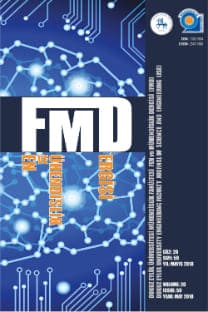DOĞAL ZEOLİTLERLE ATIKSULARDAN KURŞUN GİDERİMİ
Bu çalışmada Manisa kentinden getirilen iyon değiştirici klinoptilolit zeolitinin, endüstriyel atıksulardan kurşun uzaklaştırma kapasitesi belirlenmeye çalışılmıştır. Deneysel çalışmada 1.0-2.0 mm boyutundaki zeolit, aktive edilerek ve aktive edilmeden kullanılmış ve kurşun giderme verimleri saptanmıştır. Zeolit örnekleri 1 M NaCl çözeltisi ile 2 mL/dk akış hızında aktive edilmiştir. İyon değiştirme çalışması; kesikli deney düzeneğinde, farklı karıştırma zamanları, karıştırma hızları ve Pb+2 konsantrasyonları için sentetik su ve kurşunçinko madeni işleme tesisi ham atıksu numunelerinde sürekli akışlı kolonda yapılmıştır. Deneysel çalışma sonucunda aktive edilmiş zeolitle daha yüksek arıtma verimi elde edilmiştir. Aktive edilmiş zeolit için 5 ve10 dakika karıştırma sürelerinde kurşun giderme verimi aktive edilmemişe göre %11-%15 daha fazla olmuştur. Aktive edilen zeolitin 30 dak. karıştırma süresi sonunda maksimum giderme verimi %98 olarak belirlenmiştir. 110 mg/L kurşun içeren kurşun-çinko madeni ham atıksuyu, 5 g aktive edilmiş klinoptilolit kolonundan geçirilmiş ve yüksek giderme verimi elde edilmiştir. Bu kompozisyondaki atıksu için tek kademedeki iyon değiştirme prosesi, alıcı ortam standartlarını sağlamaktadır
Anahtar Kelimeler:
Endüstri atıksuları, Kurşun, Zeolit
LEAD REMOVAL FROM WASTEWATERS BY NATURAL ZEOLITES
This paper assesses the capacity of natural zeolite clinoptilolite brought from Manisa City as a low cost ion exchange material for lead removal from industrial wastewaters. In the experiment activated and not activated zeolites were used and the size have been adjusted to 1.0-2.0 mm by crashing and grinding. The zeolite sample activated with 1 M NaCl solution at a flow rate of 2 mL/min. Ion exchange study was done by batch experiment using different mixing time, mixing speed and concentration of Pb+2 synthetic wastewaters and continues column experiment using lead-zinc mining raw wastewaters. As a result of the experimental study, higher removal efficiency was obtained by the activated zeolites than the non-activated zeolites. The removal efficiency of activated zeolites for the uptake of lead ions is greater by 11%-15% when the mixing time is between 5 and 10 minutes. Maximum removal efficiency, 98% was observed for 30 minutes of mixing time in using activated zeolite. Wastewater containing 110 mg Pb2+/L can be treated passing the wastewater through the ion exchange column at the rate of 80 mL/hour using 5 g activated zeolite. Receiving medium discharge standards can be achieved by using continuous ion exchange process as the only treatment step for the wastewater with above composition.
Keywords:
Industrial wastewater, Lead, Zeolites,
___
- Cnang J.S., Huang J.C., Chang C.C., Tom T.J. (1998): “Removal and Recovery of Lead Fixed-Bed Biosorption with Immobilized Bacterial Biomass”, Water Science & Technology, Vol.38, No. 4-5, pp 171-178.
- D’arcy B.J., Todd R.B., WITHER A.W. (1998): “Industrial Effluent Control and Waste Minimization: Case Studies by UK Regulators”, Water Science & Technology, Vol.39, No. 10-11, pp 281-287.
- Köktürk U., Gümüş A. (1995): “Bigadiç ve Gördes Zeolitlerinde Belirlenen Lifsi Yapılı Mineraller”, YerBilimleri, Haziran, Sayı 26, syf. 33-45.
- Marani D., Macci G., Pagano M. (1995): “Lead Precipitation in The Presence of Sulphate and Carbonate” Testing of Thermodynamic Predictions, Water Research, Vol.29, No.4, pp 1085-1092.
- Lee C.L., Wang T.C., Lin C.K., MOK H.K. (1999): “Heavy Metals Removal by Promising Locally Available Aquatic Plant”, Najas Graminea Del., in Taivan, Water Science & Technology, Vol.39, No. 10-11, pp 177-181.
- Ouki S.K., Kavannagh M. (1999): “Treatment of Metals-Contaminated Wastewaters by Use of Natural Zeolites”, Water Science & Technology, Vol.39, No. 10-11, pp 115-122.
- Papini M.P., Kahie Y.D., Troia B., Majone M. (1999): “Adsorption of Lead at Variable pH Onto a Natural Porous Medium: Modeling of Batch and Column Experiments”, Environmental Science and Technology, Vol. 33, pp. 3357-4464 Patterson J. (1985): “Industrial Waste Water Treatment Technology”, Second Edition.
- Sand LB., Mumpton F.A. (1976), “The Selectivity of Clinoptilolite for Certain Heavy Metals Natural Zeolites”, Occurrence, Properties, Use. Semmens and Seyfearth.
- Smith H.E., Lu W., Vengris T., Binkiene R. (1996): “Sorption of Heavy Metals by Lithuian Glauconite”, Water Research, Vol. 30, No. 12, pp2883-2892.
- Türk Çevre Mevzuatı (1992): “Türkiye Çevre Sorunları Vakfı Yayını”, Cilt II.
- Yetiş Ü., Özcengiz G., Dilek F.B., Ergen N., Erbay A., Dölek A. (1998): “Heavy Metal Biosorption by White-rot Fungi”, Water Science & Technology, Vol.38, No. 4-5, pp 323- 330.
- ISSN: 1302-9304
- Yayın Aralığı: Yılda 3 Sayı
- Başlangıç: 1999
- Yayıncı: Dokuz Eylül Üniversitesi Mühendislik Fakültesi
Sayıdaki Diğer Makaleler
4-seviyeli tam cevaplı SEFKA sinyallerinin ilinti tabanlı demodülasyonu
EGE BÖLGESİ HAVA KİRLETİCİ EMİSYON ENVANTERİ
Tolga ELBİR, Aysen MÜEZZİNOĞLU, Abdurrahman BAYRAM, Remzi SEYFİOĞLU, Hulusi DEMİRCİOĞLU
DÜZLEMSEL ÜÇ İNDİSLİ DAĞITIM PROBLEMİNİN FORMÜLASYONU VE EŞDEĞER ÖZELLİKLERİ
Düzlemsel üç indisli dağıtım probleminin formülasyonu ve eşdeğer özellikleri
Doğal zeolitlerle atıksulardan kurşun giderimi
Ayşen TÜRKMAN, ŞÜKRÜ ASLAN, İlknur EGE
DOĞAL ZEOLİTLERLE ATIKSULARDAN KURŞUN GİDERİMİ
Ayşen TÜRKMAN, Şükrü ASLAN, İlknur EGE
Saptırılmış boru demetinde ısı transferi ve akış yapılarının belirlenmesi için teorik çalışma
